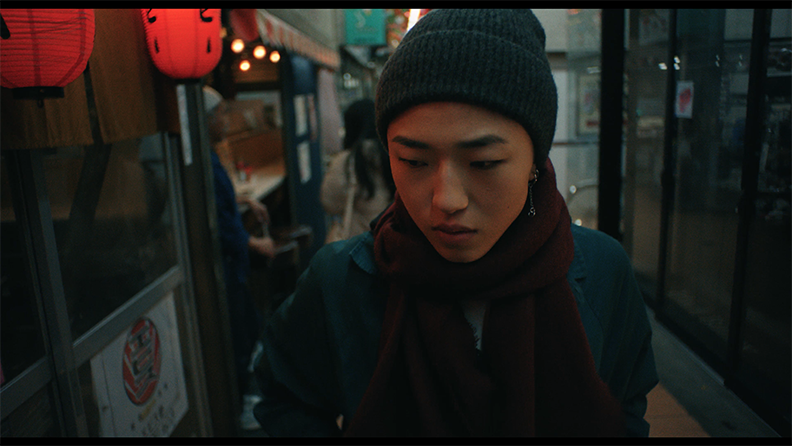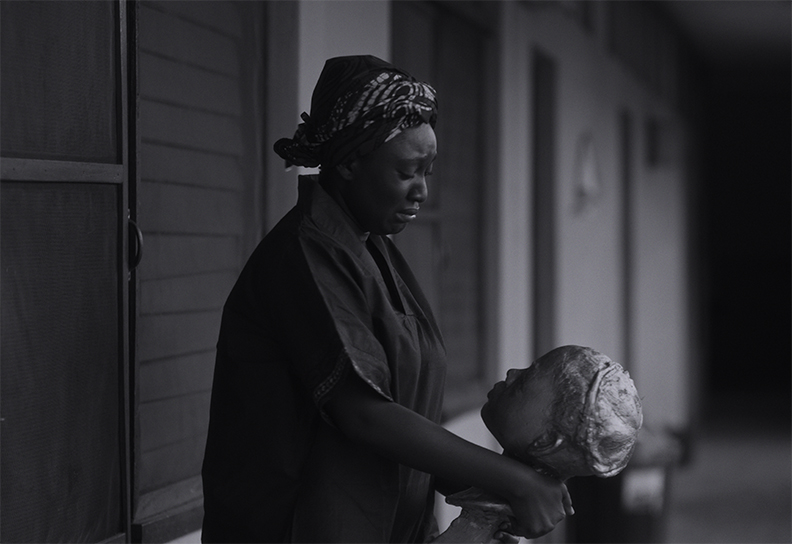
When Identity Echoes Back From the Other Side
MOVIE REVIEW
Tears Burn to Ash
–
Genre: Drama, Psychological, Supernatural
Year Released: 2025
Runtime: 15m
Director(s): Natalie Murao
Writer(s): Natalie Murao
Cast: Veena Yamano, Kay Sugimoto, Kaori Takeshita, Mar Kitagawa, Ken Takigawa, Sandra Sugimoto
Where to Watch: shown at the 2025 Vancouver International Film Festival
RAVING REVIEW: TEARS BURN TO ASH is more like a dream caught in the in-between—a story that exists in the hours before dawn, when grief and identity intertwine. Natalie Murao’s fifteen-minute short is an intimate portrayal of a Japanese Canadian woman navigating loss while confronting the cultural fracture of her own reflection. It’s a film that doesn’t just explore displacement; it embodies it.
Tammy, portrayed by Veena Yamano, arrives in Tokyo just as news reaches her that her grandmother in Vancouver is dying. She spends a single night wandering the city, trying to outrun both the call of death and the weight of her own history. Tokyo, shot through an increasingly unique lens by cinematographer Kaayla Whachell, feels less like a homecoming and more like a maze of memory. In every frame, the city watches back—alive, indifferent, and filled with versions of Tammy that could have been.
A woman grieving from afar, trapped between two worlds that will never claim her. But Murao’s direction transforms it into something visceral. This isn’t a tale of returning home; it’s about realizing there may no longer be one. Through glances, exchanges, and the pulse of Tokyo’s nightlife, the film captures the experience of a displaced identity that has been passed through generations, thinned out but never erased.
When Tammy encounters her doppelganger—a self-assured, confident version of herself who seems to belong—Murao externalizes a truth. The duplicate isn’t a horror trope; she’s the physical manifestation of assimilation anxiety. In a culture that often sees lineage as identity, Tammy’s reflection is both an act of envy and an accusation. The meeting between them, handled with restraint and silence, becomes the film’s centerpiece.
TEARS BURN TO ASH, suggests destruction through mourning. It’s an image of grief as transformation, echoing the emotional inheritance of post-war Japanese Canadian families. Murao, herself a fourth-generation (yonsei) Japanese Canadian, draws from intergenerational trauma—particularly the shadow of World War II internment. The unspoken legacy of shame and silence reverberates here, but the director approaches it through tenderness rather than exposition. Her storytelling thrives in pauses, the unsaid carrying more weight than dialogue ever could.
Veron Xio’s score merges ethereal soundscapes with distorted electronic textures, evoking both fragility and friction. The music pulses faintly beneath the surface, never overpowering but always unsettling. Like Tammy’s identity, it’s a fusion that can’t settle comfortably in one place. The sound design by Oscar Vargas extends that unease into the physical world: the echo of trains, the whisper of air conditioning, the whispers of distant conversation—all blending into a city that feels alive yet unknowable.
The film’s emotional core rests on contrast. Tammy’s awkward attempts to communicate in Japanese, the polite but distant smiles she receives, and the loneliness that lingers after each interaction—all build toward the night’s surreal turning point. The appearance of her double doesn’t bring resolution; it magnifies her disconnect. In facing the version of herself that belongs, she realizes how far she has drifted from both cultures. And remember, this all happens in just 15 minutes!
The production reflects a global yet intimate collaboration. No More Productions serves as the foundation, supported by the Canada Council for the Arts and the Japanese Canadian Legacies Society. Such a deeply personal film should arise from collective effort; the story itself is about shared lineage and cultural continuation. Each collaborator contributes a piece of that inheritance.
What lingers after the credits isn’t the otherworldly element but the humanity underneath it. Murao uses the idea of the doppelganger not to terrify but to empathize—to explore what it means to see yourself clearly only in a place that doesn’t recognize you. The film’s final image, Tammy facing the sunrise, encapsulates a truth about grief and identity: both burn, both cleanse, and both leave something behind.
TEARS BURN TO ASH is not just a story about a woman between two nations—it’s about the universal ache of belonging. Murao’s voice is distinctive, her filmmaking precise yet deeply emotional. By the end, the title feels less like tragedy and more like renewal. Tears burn, yes—but from the ashes, something new and whole begins to form.
Please visit https://linktr.ee/overlyhonestr for more reviews.
You can follow me on Letterboxd, Instagram, Twitter, and YouTube. My social media accounts can also be found on most platforms by searching for 'Overly Honest Reviews'.
I’m always happy to hear from my readers; please don't hesitate to say hello or send me any questions about movies.
DISCLAIMER:
At Overly Honest Movie Reviews, we value honesty and transparency. Occasionally, we receive complimentary items for review, including DVDs, Blu-rays, CDs, Vinyl Records, Books, and more. We assure you that these arrangements do not influence our reviews, as we are committed to providing unbiased and sincere evaluations. We aim to help you make informed entertainment choices regardless of our relationship with distributors or producers.
Amazon Affiliate Links:
Additionally, this site contains Amazon affiliate links. If you purchase through these links, we may receive a commission. This affiliate arrangement does not affect our commitment to honest reviews and helps support our site. We appreciate your trust and support in navigating these links.



Average Rating